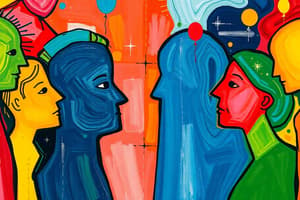Podcast
Questions and Answers
What primarily defines group socialization?
What primarily defines group socialization?
- Teaching and learning group interaction norms and expectations. (correct)
- The development of leadership skills among group members.
- The competition between groups for resources.
- The analysis of group performance metrics.
In what situation is socialization likely to be most extensive within a group?
In what situation is socialization likely to be most extensive within a group?
- During a group's stable phase with no new members.
- When a totally new group is formed. (correct)
- When members are frequently rotating in and out.
- When group members have known each other for a long time.
Which type of knowledge is primarily concerned with behavioral norms in group interactions?
Which type of knowledge is primarily concerned with behavioral norms in group interactions?
- Procedural knowledge.
- Emotional intelligence.
- Social knowledge. (correct)
- Technical knowledge.
What method is most effective for conveying procedural knowledge?
What method is most effective for conveying procedural knowledge?
How is social knowledge typically learned by new group members?
How is social knowledge typically learned by new group members?
Which of the following best describes the nature of the information exchanged during socialization?
Which of the following best describes the nature of the information exchanged during socialization?
What is a common practice for conveying a mix of procedural and social knowledge in small groups?
What is a common practice for conveying a mix of procedural and social knowledge in small groups?
What is the key focus of procedural knowledge within a group?
What is the key focus of procedural knowledge within a group?
Flashcards are hidden until you start studying
Study Notes
Group Socialization Overview
- Group socialization involves teaching and learning norms, rules, and expectations related to group interactions.
- Creation and maintenance of group norms and rules depend heavily on socialization processes.
Changing Dynamics of Socialization
- The necessity for socialization evolves throughout a group's lifespan.
- Stable, long-term groups require minimal socialization as existing members are familiar with norms.
- New members entering a group necessitate active engagement in socialization by current members.
- In newly formed groups, socialization is a continuous process where members establish norms, rules, and shared history together.
Types of Knowledge Exchanged
- Information shared during socialization is categorized into procedural knowledge and social knowledge.
- Procedural knowledge pertains to skills and information needed for group tasks.
- Social knowledge revolves around behavioral norms guiding group interactions.
Methods of Conveyance
- Procedural knowledge is easily communicated through structured means like orientations, training sessions, manuals, and documents.
- Social knowledge is often more ambiguous, usually shared informally through observation and interpersonal interactions.
Role of Organizations in Socialization
- Organizations socialize new members with different approaches depending on their structure.
- For example, a new training cohort in an established company receives technical, rule-based information through manuals alongside cultural overviews.
- Some small groups, like fraternities and professional organizations, utilize pledges or oaths to relay both procedural and social knowledge.
Importance of Informal Interactions
- Social knowledge is often communicated during unofficial interactions outside of formal group settings.
- Engaging in social activities as a group fosters cohesion, solidarity, and stronger bonds among members.
- Successful businesses promote socialization outside of work to enhance group dynamics and member relationships.
Studying That Suits You
Use AI to generate personalized quizzes and flashcards to suit your learning preferences.




